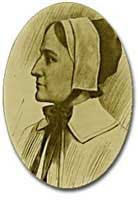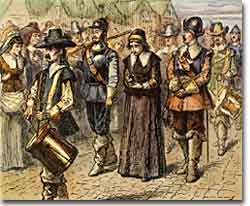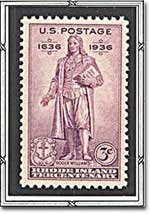3e. Dissent in Massachusetts Bay

Governor John Winthrop expelled Anne Hutchinson from the Massachusetts Bay Colony in 1638.
There was not too much room for religious disagreement in the Massachusetts Bay Colony. Puritans defended their dogma with uncommon fury. Their devotion to principle was God's work; to ignore God's work was unfathomable. When free-thinkers speak their minds in such a society, conflict inevitably results.
Such was the case in Massachusetts Bay when Anne Hutchinson and Roger Williams spoke their minds.
Anne Hutchinson was a deeply religious woman. In her understanding of Biblical law, the ministers of Massachusetts had lost their way. She thought the enforcement of proper behavior from church members conflicted with the doctrine of predestination. She asked simply: "If God has predetermined for me salvation or damnation, how could any behavior of mine change my fate?"

Mary Dyer was the first woman executed for her religious beliefs in Massachusetts Bay Colony.
This sort of thinking was seen as extremely dangerous. If the public ignored church authority, surely there would be anarchy. The power of the ministers would decrease. Soon over eighty community members were gathering in her parlor to hear her comments on the weekly sermon. Her leadership position as a woman made her seem all the more dangerous to the Puritan order.
The clergy felt that Anne Hutchinson was a threat to the entire Puritan experiment. They decided to arrest her for heresy. In her trial she argued intelligently with John Winthrop, but the court found her guilty and banished her from Massachusetts Bay in 1637.
Roger Williams was a similar threat.

The ideas of religious freedom and fair dealings with the Native Americans resulted in Roger Williams' exile from the Massachusetts colony. This 1936 postage stamp commemorates his founding of Rhode Island.
Two ideas got him into big trouble in Massachusetts Bay. First, he preached separation of church and state. He believed in complete religious freedom, so no single church should be supported by tax dollars. Massachusetts Puritans believed they had the one true faith; therefore such talk was intolerable. Second, Williams claimed taking land from the Native Americans without proper payment was unfair.
Massachusetts wasted no time in banishing the minister.
In 1636, he purchased land from the Narragansett Indians and founded the colony of Rhode Island. Here there would be complete religious freedom. Dissenters from the English New World came here seeking refuge. Anne Hutchinson herself moved to Rhode Island before her fatal relocation to New York.
America has long been a land where people have reserved the right to say, "I disagree." Many early settlers left England in the first place because they disagreed with English practice. Roger Williams and Anne Hutchinson were two brave souls who reminded everyone at their own great peril of that most sacred right.






